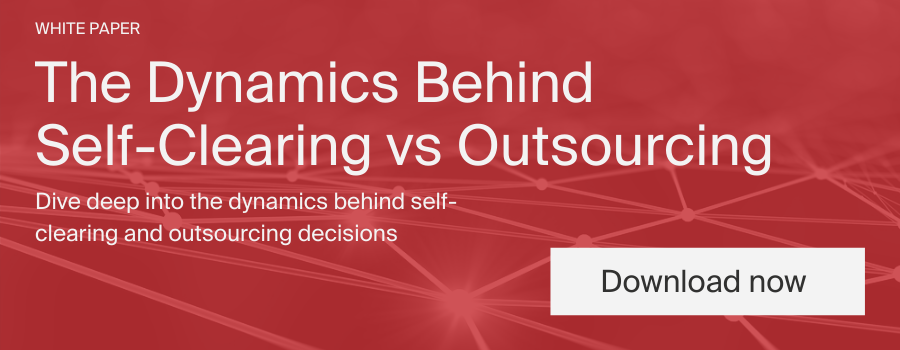
Your middle- and back-office systems are the spine of your operation: if they’re unhealthy or misaligned, the whole business suffers. But when building a strategy to differentiate your service for your customers, it’s easy to focus most of your attention on the front office.
If you want to be able to deliver scalable infrastructure, flexible data management and greater efficiency, all of your systems need to be in alignment. To take full advantage of commercial opportunities and to strengthen existing relationships, Nordic banks and brokers need to consider these four key elements of their back-office capabilities:
The past few years have been a test of existing back-office operations. The level of data quality required to support external regulatory outputs (such as MiFID II transaction reports in Europe), as well as improved internal data governance requirements under the Comprehensive Capital Analysis and Review (CCAR) in the US, have far surpassed the levels of data infrastructure needed in the previous decade.
1. Scalability – Replacing tradition with innovation
To build out a service offering for customers at the local, regional or even global level, your back office needs to be able to rapidly increase processing power. But increasing power presents several challenges for the average Nordic business. For example, many firms have created their own systems to tackle specific processes. These systems may include manual processing in parts: since manual processing is hard to scale, it can be a serious hindrance to growth. So, if a firm wants to expand their capabilities, they’ll need
to make significant technology changes. Technological changes will undoubtedly result in integration challenges to harmonise the flow of data between the old and new platforms.
If the type of business being accommodated includes anything more than flow products, processing can add a considerable burden in terms of computing power. The need to rapidly model risks and develop pricing models that effectively reflect the risks, places a demand upon any firm’s computing assets.
2. Flexibility – Greater control empowers business decision-making
When working with clients both inside and outside of the Nordic region who wish to trade inter-market, it puts a lot pressure on the firm’s operational agility. Handling a host of different factors—from regulatory regimes to local processing conventions to different currencies—requires a firm to have considerable flexibility in its processing. But it’s nearly impossible to be flexible if a company’s back-office systems are a patchwork of
silos, separated by function or product.
A firm needs to be able to respond to market events and changes in client requirements when they happen. This means businesses don’t just need to be dynamic: they also need to be future-proof. Investing in the right platform now can save you time (and headaches) when adapting to the next wave of regulation, or new asset classes such as cryptocurrency, or firms with different requirements such as proprietary trading firms. Firms that don’t invest in flexible technology now might find themselves hamstrung by operational deficiencies when their peers are able to service these new lines.
3. Automation - Superior efficiency for high-volume process
Increased automation means less time focused on repeated tasks, with more resources available to focus on servicing clients effectively. By reducing the volume of work that needs oversight, firms can focus their expertise on lower volume, harder problems, and on delivering better solutions to their clients. It also reduces the time spent on firefighting and dealing with issues.
By removing the bottlenecks for end-to-end processing, a business builds the confidence to take decisions on new opportunities when these opportunities present themselves. And by centralising processes onto a single back-office platform, businesses can create real efficiencies in data management. Firms that start with different pools of data risk continuing using different pools of data and falling afoul of the many regulations that
demand a single view of risk and finance.
At some point, it becomes very challenging to calculate these overall positions. Without consolidation in the back office, there is a risk that the firm creates a cosmetic change in its client-facing operations and international business, but behind the scenes it remains inefficient and slow.
4. Common language - Data standardisation and control
There is a level of trust that exists across sell-side firms in the Nordic markets, based upon a common legal and regulatory culture. This creates a safety buffer where data is concerned. But for Nordic firms working in other jurisdictions, those practices cannot be relied upon. To provide greater data security and better information protection, firms need to centralise the management of data. A crucial element of that is the centralisation of the data itself using a single platform so that it can be monitored more effectively. A solid platform enables a firm to aggregate multiple sources, then use the data in keeping with the firm’s policies.
In summary: Adopting these four best practices will support firms in their potential to grow, to operate in global markets, and to bring clients with them as they expand. The capacity to generate returns outside of the Nordic markets, whilst retaining business within them, hinges upon a strategic approach to expansion in back and front office operations that pre-empts the opportunities when they occur.
About Torstone Technology
Torstone is a leading global provider of cross-asset securities and derivatives post-trade processing technology. Torstone’s modern, award-winning Inferno platform is fast, flexible and future-proof. It enables global financial firms to reduce their costs, achieve greater control, minimise risk, and drive operational efficiency. Combining many decades of investment banking expertise with in-depth global financial market and technology industry knowledge, Torstone offers agile, secure, scalable, and cost-effective solutions.





